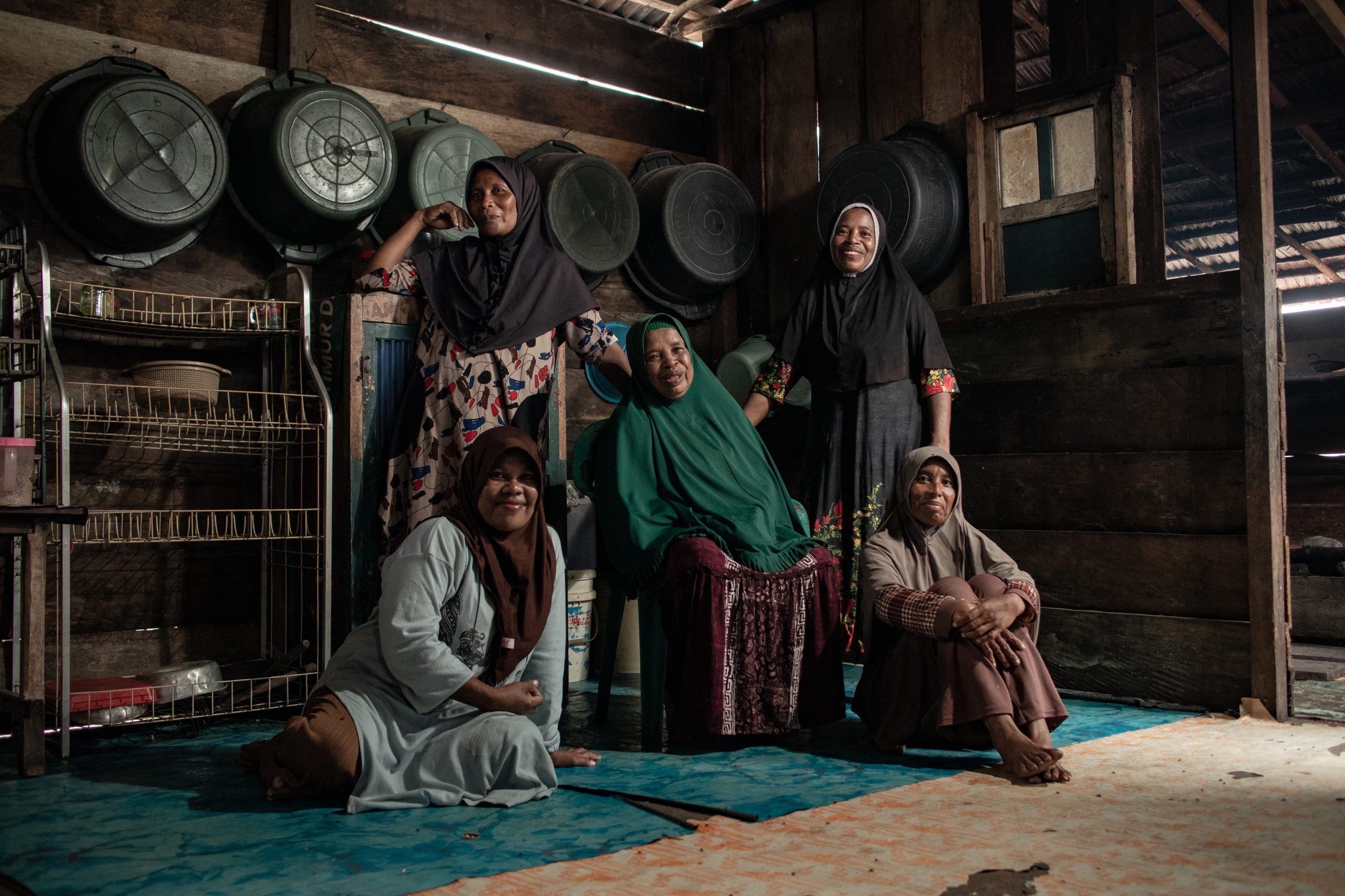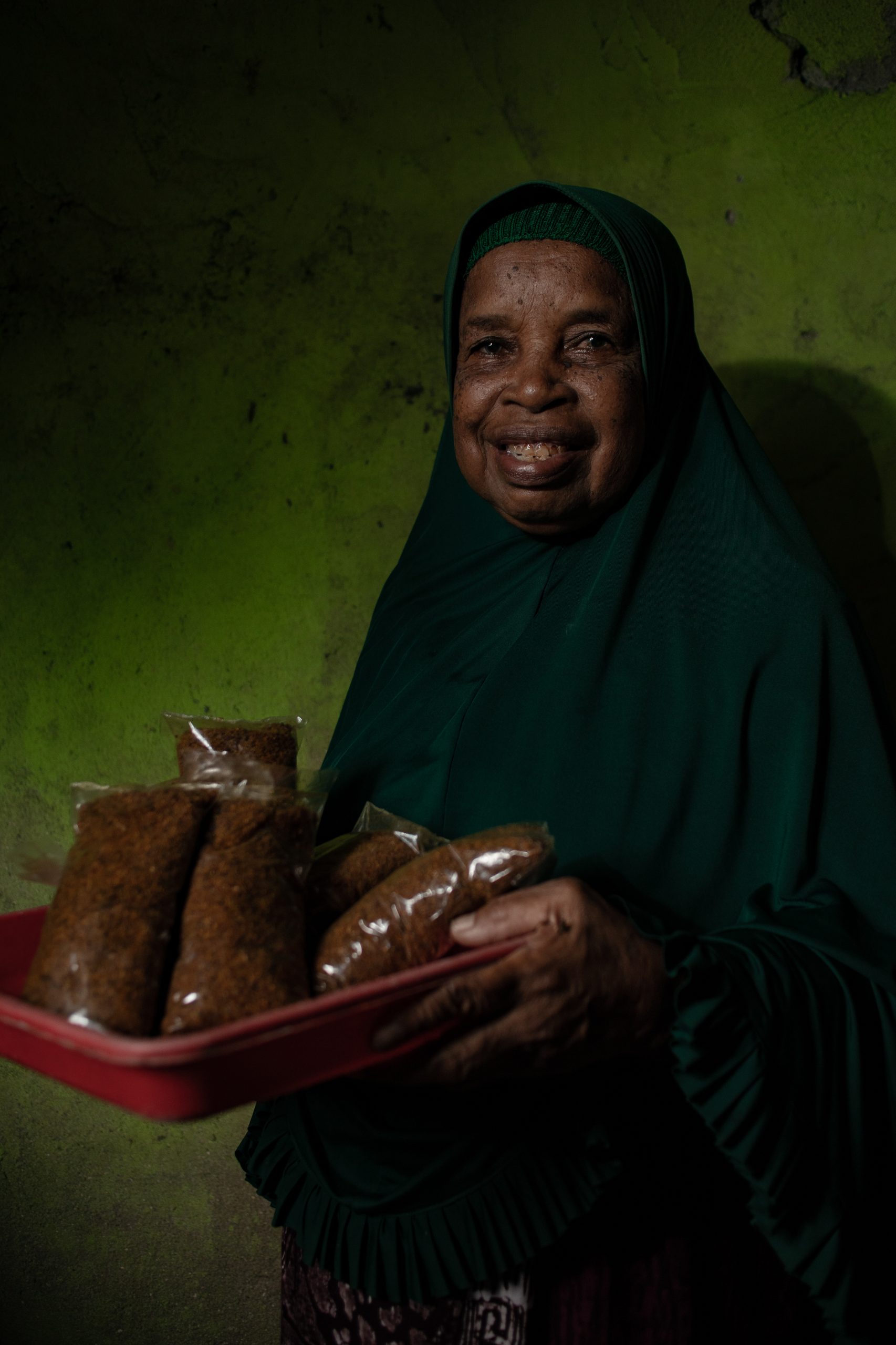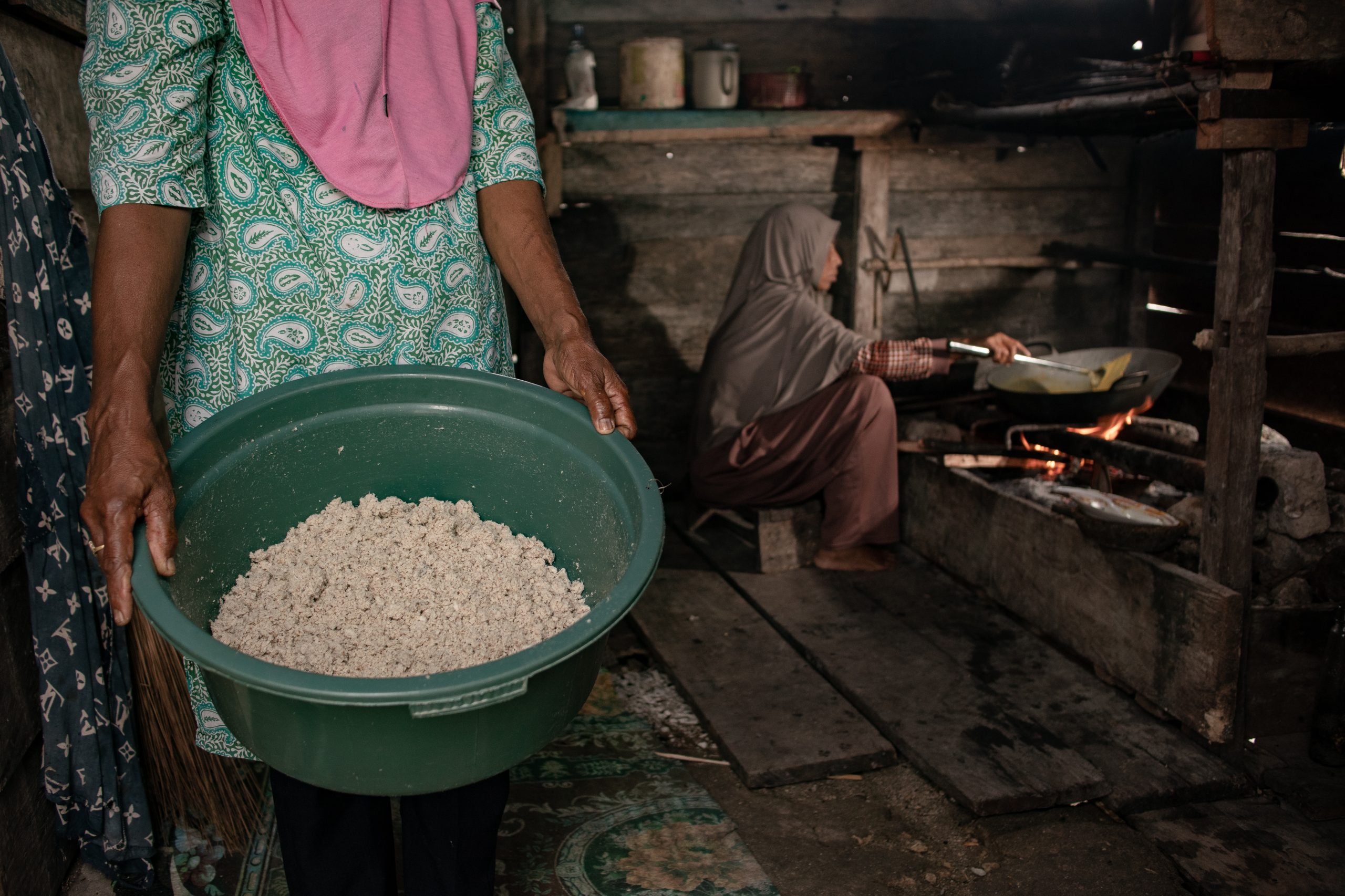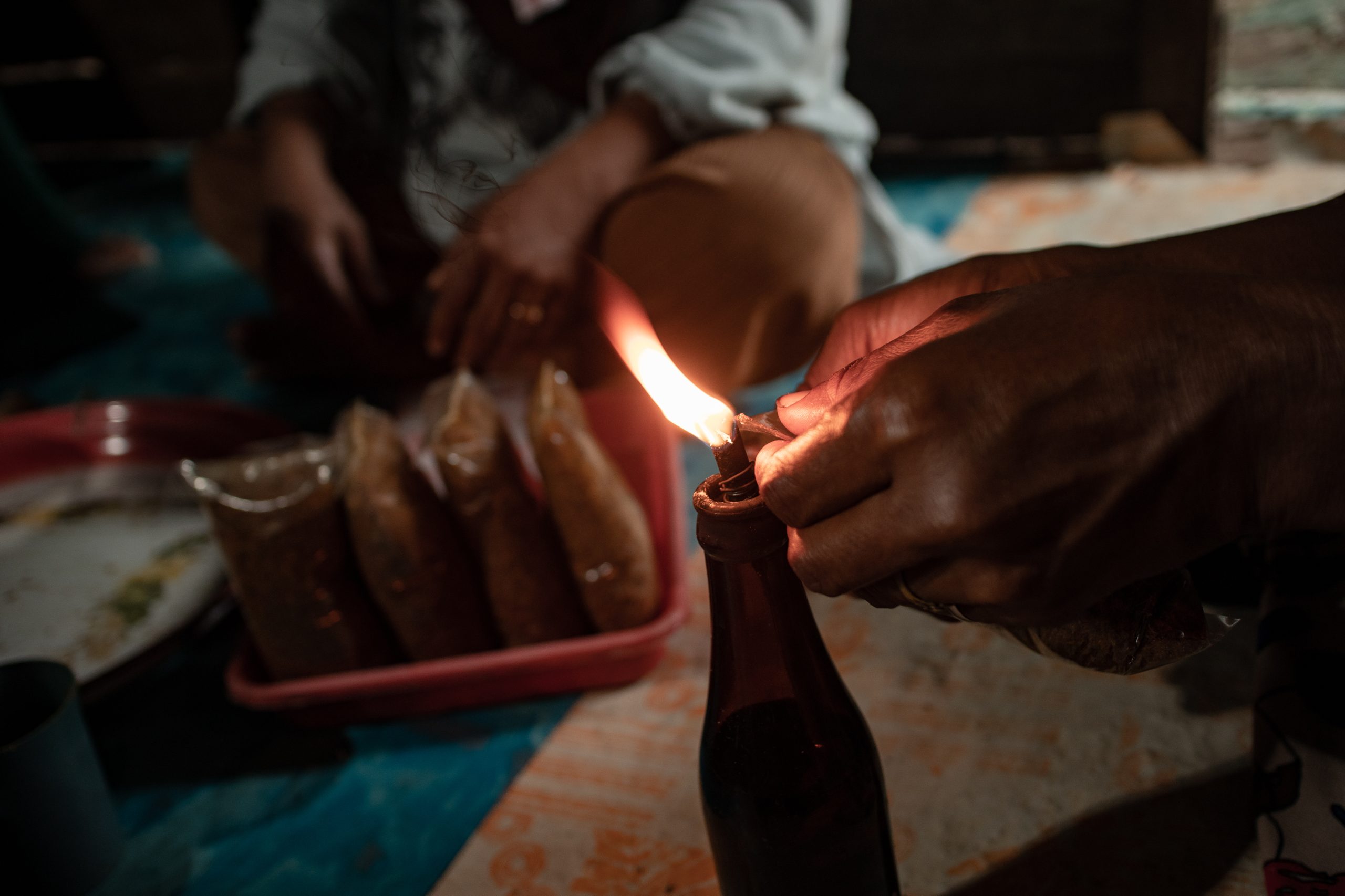
In a kitchen, six women sat on a concrete floor covered with a mat. There were shallots, garlic, coriander seeds, peppers, cayenne peppers, limes, and thick coconut milk freshly grated from a ripe coconut.
Smoke from a wood-burning stove swirled over the ceiling, and a large frying pan on top of it began to release the sautéed spice aroma. In this four-square-meter kitchen, the iconic fish floss of Nama Lena Island was made diligently and collectively.
These women are members of a marine product processing group formed after participating in the BangKIT training program at Teluk Waru Sub District Office, Seram Bagian Timur District, Maluku Province, in 2024.
Electricity has not been installed in this village. The fisherman’s unsold catch often rots because they do not have cold storage. Processing it into shredded and salted fish are ways to extend the shelf life of the fish. That is why this livelihood was addressed in Nama Lena Village planning in November 2023, facilitated by BaKTI Foundation under the Inclusive Rural Community Livelihood Development Program in Eastern Indonesia (BangKIT).
Livelihood problems faced by the community must be shared and discussed to jointly find a solution. Fish floss processing, which is currently done by individuals, has become one of the agreed livelihoods to develop. Hence, the technical training on fish floss processing and marketing was carried out based on the proposal submitted in the village planning.

One of the most active and popular villagers participating in the training was Jamia Kilderak, a 60-year-old woman.
“We have participated in the training three times. We learned how to make the floss tastier and to work in a group,” said Jamia.
Her hands were agile, continuously stirring the shredded fish in the pan, while her eyes occasionally monitored the dryness of the shredded fish she cooked. The fish she bought last night was processed into floss. “It takes time stirring it because of the coconut milk,” she said.


Jamia admitted that before attending the training, she had been making fish floss independently for a long time. Yet, the quality of her products was not as good as it is now. The floss was dark brown, a bit greasy, and the packaging was plain, clear plastic.
After the training, she understands more about the appropriate techniques for floss processing and also proper packaging for more attractive and long-lasting products.
Now, her fish floss products look drier, light brown, and tastier. Jamia starts using zip-lock plastic too. The technique is basically the same. To her, the difference is more in the taste and presentation, and reliable teamwork.
Starting from My Kitchen
Jamia has been making fish floss for ten years. She was self-taught by relying on her cooking instincts. The fish varies, depending on the fish available in her village, such as chub mackerel, horse mackerel, flying fish, to stone fish.
“Any fish available,” she smiled.
She bought the fish from fishermen in the village at different prices, starting from Rp15 thousand for three fish to Rp60 thousand per kilogram. She usually buys around 20 fish to be processed with her group.
Before working in a group, Jamia did everything herself, from grating coconut, pounding spices, to stirring shredded fish for hours. She marketed the products in the village too.
“If it’s not sold out in the village, I took them to Waru or Geser,” she explained.
One large fish can produce around six to seven packages of fish floss. By the price of Rp25 thousand per package, she makes enough money to meet the kitchen expenses and to send her children to school.
Crossing the Sea for a Trade
Jamia is not only a marine product processor, but also the backbone of the family. She produces fish floss and salted fish every day. That is the main source of income for her family.
Once a week, she departs from Nama Lena Island to Teluk Waru Sub District. To cross, Jamia uses a rented boat to Belis Village, which costs 100 thousand rupiahs for a round trip. ” I can only cross when the sack is full (of salted fish),” she added.
On arrival, she rents a car to Airkasar Village in Tutuk Tolu Sub District for 200 thousand rupiahs. She sells directly by herself and leaves some products, around six to seven packs, in a shop there.
“If they run out of stock, they contact me immediately,” said Jamia.
She sometimes carries 20 packages of floss in one trip. Other than Airkasar, Jamia also visits Geser Island regularly. “If it is not sold out in the village, I take it outside,” said the mother of six.
Her fish floss becomes more popular. Buyers from Bula Sub District, the capital of Seram Bagian Timur District, occasionally come to buy.

Sending Children to School
Jamia lives on Nama Lena Island, also known as Parang Island. This small island is located in the southeast of the Seram Sea, Maluku Province. The village is inhabited by around 214 people. To get to the island, people must travel from Belis Village, Teluk Waru Sub District, for around 45 minutes by boat.
Jamia built her life on an island where facilities are bare minimum and far from the district center. She is the breadwinner in the family. She relies on the selling of shredded and salted fish to send her children to school.
Despite the money she makes from the fish floss, which is around 800 thousand rupiahs per month, Jamia feels the need to have more income sources. She then makes salted fish to grow her business. She buys raw fish from fishermen and processes it herself. She washes the fish, splits it, and applies salt to it. The fish is then put under the sun for three days. If the fishermen get a lot of fish, but she does not have money, Jamia has to borrow and pay it off after the salted fish are sold out.
“If the sun shines bright, it will dry in three days,” she said. “I sell three for 10 thousand rupiahs.”
In a month, from salted fish alone, she can make 1.8 million rupiahs. She sells it in the village and outside of Nama Lena Island.
With that income, Jamia is now able to support her two daughters who are still in schools. One is in the second grade of Vocational High School (SMK) in Teluk Waru Sub District, and the other is in her fifth semester of college in Bula Sub District. Their school fees are paid by the their mother hard work.
“I work like this, but I can send two daughters to school,” she said in a slightly shivering voice.
The Hope of Nama Lena Women
Jamia is not only a strong mother figure in her village. She is also a symbol of women’s strength on small islands often neglected by development. Despite the disadvantages, poor access to electricity and infrastructure, she keeps her spirit alive.
Jamia keeps innovating to grow from a small kitchen, a pot, and a stove that is lit every day.
The training from the BangKIT Program gave her a new spirit. Now, she no longer works alone, she works with five other women, sharing the work, and encouraging each other. By participating in the exhibition held by the Seram Bagian Timur District Government on June 3, 2025, she wishes her fish floss products to be recognized and to enter a broader market outside of Nama Lena Island.
“It is managed manually. One pack of fish floss is filled with three spoons of rice,” said Jamia while explaining the measurements of her product.
She expects support from the local government in marketing their products to a broader market.
Not only that, Jamia and her group also hope for the fishermen to maintain the fish supply for them to sustain the production of shredded and salted fish.